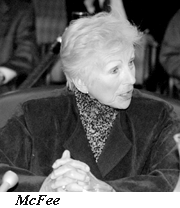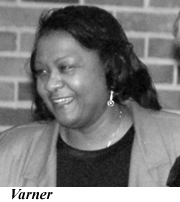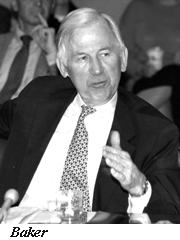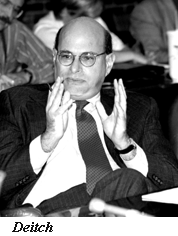The University Record, November 14, 1996
Regents select Bollinger in three-hour session
By Jane R. Elgass
Partly because of his love for the institution and passion about the value of education, Lee C. Bollinger was offered his “dream job” last weekto serve as the 12th president of the U-M. His immediate reaction: “Oh my God. What a wonderful day.”
The phone call to Bollinger informing him of his unanimous choice by the Regents, acting as the Presidential Search Committee (PSC), was made by PSC co-chairs Nellie M. Varner and Shirley M. McFee. Varner was the first to talk to Bollinger and said he was “truly, truly ecstatic, all his comments were praise and joy, and he was very thankful for the opportunity to come back to Michigan.”
 McFee noted after the phone call that “there was no question he wanted the job. I take great pleasure that we arrived at a decision and that it was unanimous.”
McFee noted after the phone call that “there was no question he wanted the job. I take great pleasure that we arrived at a decision and that it was unanimous.”
During the three-hour session Nov. 5, several of the Regents commented on Bollinger’s deep love of the University. Regents also identified Bollinger as a candidate who would “hit the ground running”an ability they said is particularly important for the University at this stage in its history.
In presenting a motion authorizing Varner and McFee to negotiate with Bollinger to accept the presidency, Regent Daniel Horning noted that if Bollinger “truly is passionate about Michigan, is optimistic about our future, and the president’s role is to inspire, I look forward to walking hand-in-hand with him if he accepts.”
During the Nov. 5 meeting, the Regents reviewed the processes they undertook as individuals to determine their choice, and in many cases reviewed the qualities they found in all the candidates recommended by the Presidential Search Advisory Committee. The other finalists were Stanley A. Chodorow, University of Pennsylvania; Carol T. Christ of the University of California, Berkeley; and Larry R. Faulkner, University of Illinois, Urbana-Champaign.
In addition to reviewing written materials about each candidate and participating in the public interviews, Board members received numerous phone calls, letters and e-mail messages from colleagues across the nation; placed calls to colleagues familiar with each candidate; reviewed carefully the selection criteria they had developed; and pored over hours of videotapes and lengthy transcripts of the candidates’ public interviews.
The Regents agreed that all four were outstanding candidates who would become president of a top university in the near future, if not the U-M.
Regent Rebecca McGowan said that the advisory committee had produced “the cream of the cream of emerging university leadership,” and McFee noted that “a step up is well within each one’s capabilities and aspirations.”
Search consultant Malcom MacKay of Russell Reynolds Associates Inc., also spoke briefly at the meeting, noting that the search was “the most thorough, disciplined, extensive search” he had seen, adding that the three not selected likely would become presidents elsewhere.
He commended the Regents for their “courage and staying the course under bizarre circumstances” that resulted from a court ruling that denied the Regents the opportunity to speak with the candidates in private.
MacKay said he had “serious concern” about that aspect of the search, adding the state’s Open Meetings Act is “seriously flawed” and that the Regents should prevail on the legislature to change to law.
 Varner reflects on selection criteria
Varner reflects on selection criteria
Prior to the presentations by individual Regents, made in order of seniority, Varner noted that the Board has a history of selecting the right leader at the time and that they all looked to the needs of the University as reflected in the criteria set by the Board in reaching their choice.
These included an individual with strong leadership capabilities who could heal and unify the campus and its many stakeholders, who would work in a consultative manner and would be able to effectively communicate the values and mission of the University to internal and external constituents.
The University needs a “leader’s leader,” she said, someone who could guide the institution through its current pressing challenges, including the changes in the Medical Center imposed by the changing health care environment.
She also noted that the University needs “decisive and effective leadership as quickly as possible.”
 Deane Baker
Deane Baker
Regent Deane Baker led off the discussion and indicated that Faulkner was his choice, but that that choice was conditional on finding his conduct correct relative to a question on a sexual harassment case asked by law Prof. Catharine MacKinnon at Faulkner’s town meeting.
Baker looked for a candidate who would engage others in decision-making, was aware of the importance of both the sciences and humanities, someone who engendered mutual respect, had an ability to analyze diverse issues, who reflected Midwestern values and had a “body of experience learned away from the U-M.”
Nellie Varner
Varner, who detailed the strengths she found in each of the candidates, commented on Bollinger’s “passionate love for the institution,” adding that he knows the U-M and understands its strengths. He also could “hit the ground running” and move quickly to assure everyone that “all is well at Michigan.”
She commented on his deep appreciation for the academic culture at the U-M, the importance he places on the student-teacher relationship, and his management styleone of hiring strong people and giving them the space to manage.
Philip Power
In reviewing the actions he undertook to select a candidate, Regent Philip A. Power noted that the task was not a task of determining “who’s good or who’s not good,” but rather finding one who fit his criteria. These included someone who could promote “healing” among the Regents, executive officers, faculty, staff, students, alumni and other constituencies outside the University, including government officials and donors.
He also wanted someone who would identify and recruit a management team of leaders, and who understands the complicated health care scene and could develop appropriate strategies to maintain the U-M’s strength in that area.
Most of all, he wanted someone who could create a “shared vision and collaborative agenda” for the University.
He noted that in “thinking behind the words,” Bollinger “met very nearly exactly my criteria.” He sees Bollinger as someone who would offer “no surprises,” would have many and frequent conversations with the Board, who would attract good people to a management team, and who sees the job as “fun to do.”
Shirley McFee
McFee sees Bollinger as a “leader who listens” and who understands the value of higher education, both public and private, and said he would be an “articulate advocate” of public universities.
She said his management style is one of creating a team that complements and supplements the presidency, and that he is dedicated to maintaining academic standards in research and teaching. His Michigan experience, she noted, “is a plus.”
McFee also commented on Bollinger’s commitment to academic freedom and freedom of speech, noting “that’s what we’re all about.”
Rebecca McGowan
The court ruling was attacked by McGowan, as was a newspaper’s contention that the Board was working from a “B list” since no sitting presidents were on the list, and that the Regents would be taking a “shot in the dark” in selecting a president. “I found this extremely ironic since it is the process imposed on the University by that and other newspapers that has created any of the darkness in which we or the finalists find ourselves,” she said, noting she felt the PSAC had presented an “A list.”
She said the Regents had to make a tough choice among the candidates, who presented an “embarrassment of riches.”
She sees Bollinger as being “clear in his purpose” and “refreshed and stimulated by his Dartmouth experience.”
“He described gaining a sense of the bigger picture by looking at something smaller, a really fine undergraduate teaching institution, but his first love is this University. He said, as a man who has experienced it, `The more you see the world, the more you see the truth of Michigan’s greatness.'”
In supporting Bollinger, McGowan said the University requires a president “who can talk to us, consult with us, learn from us, lead us and then turn the face of the University of Michigan to the state and to the nation.” 
Laurence Deitch
Noting that the University is uniquely positioned for the future and needs a president who will lead it into the next millennium, Deitch looked for an individual “who provides the best fit for the University at this time. We need a president who will invigorate our sense of community and who will help to build a focus of pride among the University’s various stakeholders.”
He characterized Bollinger as an “extraordinary candidate,” adding that “we are lucky he wishes to be president.”
He searched for a candidate who could develop shared values and mission and “direct the strategy” to achieve them and sees in Bollinger “an intellectual of enormous breadth that is consistent with Michigan’s great interdisciplinary strength and tradition.”
He said Bollinger would be an effective spokesman nationally and internationally, adding that Bollinger said he would, when possible, write his own speeches “because he felt it important to articulate his views in his own voice.”
He sees Bollinger as a national academic leader committed to both the Michigan Mandate and the Agenda for Women and to diversity, and as a “listener and a conciliator, yet at the same time he is a person of conviction who will not be afraid to take principal stands on tough issues.”
“He is trusted and respected,” Deitch said, “and will imbue the University with his own aura of excellence.” He also was particularly impressed with Bollinger’s belief that faculty should be accessible to students and that he planned to continue to teach.
Andrea Newman
In making her presentation and indicating that she was not going to tip her hand, Regent Andrea Fischer Newman noted that it was “obvious we’re not all going to agree. She did note that whomever the Board picks, “those of us sitting around this table will coalesce and support the ultimate candidate no matter who it is, whether or not that candidate is our first choice. And I think that’s extremely important because we come at this from eight different ways.”
“I am awed by the magnitude of this responsibility,” she said, adding that each candidate had exceptional strengths and that the Regents “can’t go wrong with any of these four candidates. It is our job to choose the individual to lead this institution into the next century and to choose the individual that we believe is right for the institution at this time.”
Stating that she looks at the University “from a very practical standpoint,” she said she sought a leader who could build consensus, was a good manager who could work equally well with government officials and in the development arena, who understood academics and “can help change the way that academics think about spending money while preserving the academic mission and integrity of the institution.”
Dan Horning
Horning said he felt hampered by the court ruling but noted that despite that “the most important thing I can do is select the best person for president of the University.”
He said the charge that the Regents were working from a “B list” was “upsetting and takes away from the sparkle of the candidates.”
“There is no doubt in my mind that Lee Bollinger is our man,” Horning stated, adding that the other candidates were “stellar.”
“This is a time in Michigan where we need someone who can hit the ground running.”
He added that in making it public he supported Bollinger, “it is not in deference to the other candidates, but it’s that I think it is right for today, it is right for Michigan, it is right for this institution.”
A note of dissent
When McFee began formally polling the Board members on their choice, a note of dissent was injected by Baker, who said his view of Bollinger was “quite different than what one sees here and I may not be able to vote for Lee Bollinger.”
Baker said that Bollinger has “developed a record which has offended a very broad cross-section of people who support this University,” citing Bollinger’s testimony while dean of the Law School against Judge Robert Bork’s nomination for the Supreme Court, saying that that type of activity should not be engaged in by a president of the University. He also cited Bollinger’s decision to ban recruiting at the Law School by the CIA and FBI, which Baker said defied the wishes of both the president and the Board at the time.
In addition, he claimed that during the 1988 interim presidency of Robben Fleming when a speech code was being developed that Bollinger advised the code would pass the test of constitutionality and then changed his mind.
Baker also criticized what he called “a very heavy-handed political campaign to put Lee Bollinger in the office of president of Michigan,” saying that “when you have a search process such as this one, you are put in a position of having to sacrifice your individual judgment because of the pressure of such things.”
He did concede that Bollinger “would make a good president, but I think that the net effect of his presidency will be to alienate a substantial number of our supporters throughout the state.”
In challenging Baker’s statements about the speech code, Power said he was saddened at the comments but would “defend [Baker’s] right to make them.”
He said that in anticipation of the day’s discussion he had contacted Fleming about his recollections.
“Former President Fleming’s memory corresponds with mine that at no time did then-Dean Bollinger assure the Regents that the activities that they were considering were constitutional and in fact he explicitly stated that it was inappropriate for the dean of the Law School to act as the Regents’ lawyer.”
McGowan challenged Baker on the Bork testimony, stating that “at the University we go for facts before we reach conclusions.”
Citing the transcript of the Regents’ interview with Bollinger, McGowan said that when Baker asked him if he would take such an action as president, Bollinger said, “My answer is no, I don’t think that the University president should take on the issue of the nomination of Robert Bork.
“My view is that the president on that particular issue would not because it’s so controversial because you represent the institution at that time and not simply the law. I would say that I would not have testified,” he said.
McGowan added,”It’s very important that at this table we talk about the facts. And we can disagree but let’s disagree based on the facts and not reflections.”
Deitch also commented on Baker’s statements, saying he would “defy you to find a woman or a man in America at age 50 who doesn’t have a record of thingsif they are a candidate for a job of this importancethat they’ve done that some people might disagree with. And I would say that if you found a person who didn’t have a record where somebody could disagree, that is not the person you want for this job.
“I think the leader of a university needs to have a few political skills, [be able] to stand on principle but also to be able to build consensusto move people toward the common ground of what they agree upon in advancement of the common goal,” Deitch said, adding that he respected Baker’s reservations.
Newman never did “tip her hand” as to her choice, noting during the end of the polling, “I can count. There are six votes for Bollinger.
“I see no need anymore for divisiveness or dissent, I see a need to support. I could support any of the four as president and I will,”she said, then indicating that she would “pass.”
When ultimately pressed she said she had many differences of opinion with Bollinger, but that he “needs everybody on this Board to support him, needs everybody’s help in Lansing, and needs everybody’s help at this University, and I will support him.”
Baker, still with reservations about Bollinger, made the decision unanimous, stating he respected him for his scholarship and for his ability, but disagreed with him “very deeply on a number of other issues.”
“This is a public Board, you have public members, they are elected to represent the people of this state. This place would not be the kind of institution it is if everyone was a rubber stamp in this place. And sometimes it tends to be that.
“My views are offered in good faith as yours are, and I accept the views that disagree with me in good faith. I will support the nomination.”

